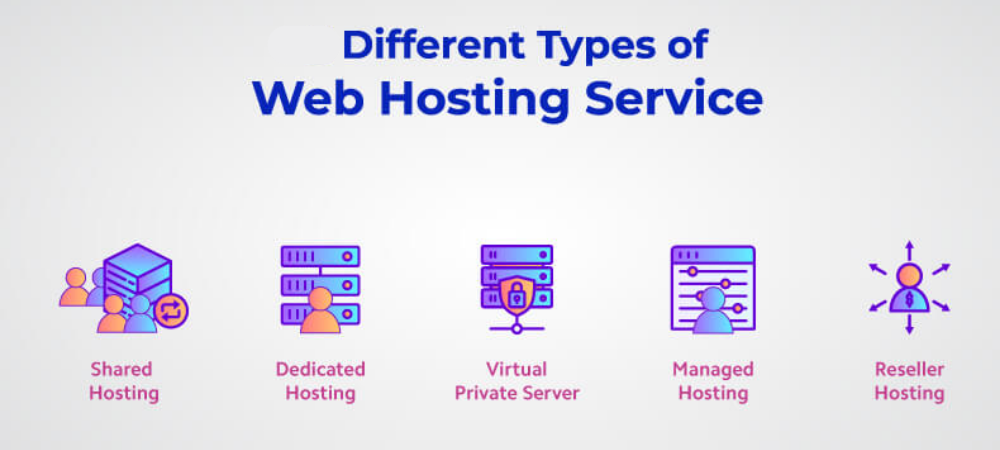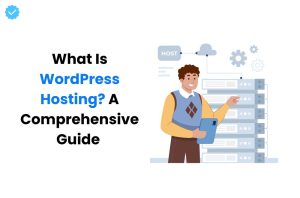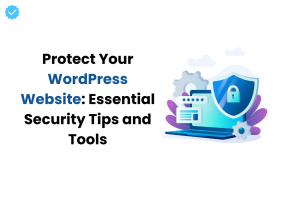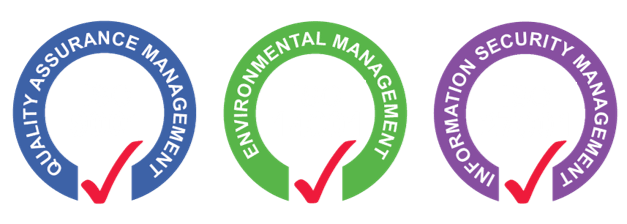So, you are planning to showcase your fantastic website to people all around the globe, whether it’s a blog, your online business, or a portfolio showcasing your talent. But “Where should I start?” is the only thing going through your mind. Well, worry not, as we are here to help with our hosting your own website guide to help you figure out how to host a website and show it to the world.
When you host your own website, you effectively give it a place to live on the internet. This is where your website’s files, data, and all the great stuff you’ve made will reside. It’s like renting a storefront in a mall to open your dream shop, but this mall is the World Wide Web, and your shop is your website!
What Do I Need to Host My Site?
You require the following two essential components that you need before hosting your own website:
Web Hosting Service Provider
To host your website, a web hosting service provider offers ready-to-use web servers. They handle the technical details and give website owners tools that are easy to use to manage their hosting.
Domain Name
Users can discover your website on the internet by using its domain name, which serves as its address. For instance, the domain name wpprovider.com directs you to this page. Accredited registrars sell domain names for sale.
Preparing for the Hosting Process
You have some preparation to complete before we get into the deep gritty of hosting your own website! Proper planning is the first step in successfully hosting your website. Consider it like preparing all of your ingredients before cooking a wonderful dinner. Here’s what you need to do:
- Organize your website’s assets: Ensure your website files, images, and content are well-organized.
- Choose a unique domain name: Give careful consideration to choosing a unique domain name for your website.
- Understand your website’s goals: Clarify the purpose of your website to make informed decisions.
- Get a good cup of coffee (or tea): Trust us; this journey is going to be exciting but requires some caffeine-fueled energy!
Now that we’ve got our prep done, let’s move on to the main course!
Choosing the Right Hosting Provider

Choosing the right hosting service provider is very important to maintain minimal downtime and smooth performance of your website. Now, you must be wondering how you can choose the ideal hosting provider in this plethora of options available in the market. Don’t worry; we’ve got the lowdown on what factors to consider:
- Performance: The secret is speed! Your visitors won’t use the dreaded “back” button if your website is hosted by a company with dependable servers and quick load speeds.
- Uptime: Nobody enjoys a website that is always unavailable. Try to find providers with 99.9% or higher uptime guarantees.
- Scalability: As your website expands, you’ll need a host that can do the same. Look for solutions for simple scalability.
- Support: Things may go awry in the world of technology. A Provider with a helpful support team can save your life.
- Pricing: Hosting packages come in a variety of sizes and styles. Find one that is within your price range without sacrificing quality.
Types Of Web Hosting Services
Different websites have unique needs since not all websites are built the same. Hosting providers are aware of this and provide a range of hosting plans to accommodate different demands. Here are some typical hosting services:

- Shared Hosting: Ideal for startups, blogs, and tiny websites. Due to the fact that several websites use the same server resources, it is inexpensive. An excellent option for novices.
- Virtual Private Server (VPS) Hosting: VPS hosting provides your website with a partitioned-off private server in a more adaptable shared hosting environment. You get the advantages of shared hosting while getting dedicated resources.
- WordPress Hosting: This service, which was created especially for WordPress websites, it takes care of upgrades, backups, and caching so you can concentrate on your content and company expansion.
- Dedicated Hosting: This service offers a whole server only for your website. Large, busy websites that need complete server management are best suited for it.
Now that you’ve picked your hosting provider, it’s time to stake your claim on the internet!
How To Host Your Own Domain: Getting The Domain Name
The domain name is like the house address of your website and the first thing that a visitor notices. It is essential to choose a domain name that is catchy and easy to remember. Here are some best practices for selecting a domain name:
- Keep it short & memorable: Long, complicated domain names are hard to remember. Keep it snappy!
- Avoid hyphens & numbers: Random Numbers and hyphens can confuse visitors. Stick to letters for better retention.
- Include keywords: If possible, include keywords related to your website’s content. This can boost your SEO.
- Check for trademark conflicts: Ensure your domain doesn’t infringe on any trademarks.
Tips for Domain Privacy & Security
- Enable WHOIS Privacy: Most registrars offer this service, which hides your personal information from the public WHOIS database.
- Use Strong Passwords: Protect your domain registrar account with a strong, unique password.
- Enable Two-Factor Authentication (2FA): This extra layer of security can prevent unauthorized access.
Choose a Content Management System (CMS)

Content Management Systems (CMS), as the name suggests, are software that makes website creation and management a breeze. CMS allows multiple contributors to work and make changes on the website at the same time. Here are some popular CMS options:
- WordPress: The CMS monarch is known for its simplicity of use and extensive plugin library.
- Joomla: Provides sophisticated functionality and flexibility to advanced users.
- Drupal: A developer’s dream, Drupal is great for complex websites and customization.
Installing Your Preferred CMS: The majority of hosting providers offer one-click installations for well-liked CMS substitutes like WordPress and Joomla. It’s as easy as placing a pizza order! Just select your CMS, and your host will handle the installation.
Making the CMS Your Own for Your Website: It’s time to make the CMS your own. Select a theme that complements your website’s design, and add plugins to increase functionality. By doing this you can quickly change how your website looks and functions.
Security Procedures
SSL Certificates & HTTPS for Website Security: SSL Certificates and HTTPS are essential for website security. Get an SSL certificate to protect data transmission between your website and its visitors. This not only secures sensitive information but also boosts the reputation of your website.
Security Against Malware & Hacking: The internet can be a dangerous place, and your website needs security. Install security plugins and adhere to recommended practices to protect yourself from viruses and hacking attempts.
Backups on a Regular Basis & Data Recovery: Back up everything! Back up your website on a regular basis to guarantee that you can restore it in the event of a disaster. Automatic backup options may be available from your hosting provider.
Website Optimizations

SEO Optimizations: If you want your website to stand out in the crowded online space, you’ll need to optimize it for search engines. This includes keyword research, meta tags, and other SEO techniques.
Improving Page Loading Time & Performance: Website speed is a major issue. You can improve the performance of your website by employing a content delivery network (CDN), compressing pictures, and minifying code.
Mobile-Friendly Design: Mobile users make up a sizable portion of your audience. Check if your website works and appears the same on mobile devices such as smartphones and tablets. Google prefers mobile-friendly websites, and your consumers will agree.
Launching Your Website
Announcing the Website Launch: It’s Showtime! Announce your website’s launch on social media, in your network, and anywhere else your potential audience hangs out.
Monitoring Traffic & User Engagement: After the launch, keep an eye on your website’s traffic and user engagement. Tools like Google Analytics can help you understand how people are interacting with your site.
Troubleshooting Common Launch Issues: Be prepared for hiccups. If you encounter issues, don’t panic. Your hosting provider’s support team can often help you iron out any wrinkles.
Ongoing Website Maintenance

Regular Updates & Content Management: Websites aren’t set-it-and-forget-it. Regularly update your content and software to keep your site fresh and secure.
Monitoring Website Performance: Check your site’s performance regularly. Slow loading times or other issues can deter visitors.
Handling Customer Inquiries & Feedback: Interact with your audience. Respond to comments, social media messages, and emails. It’s a great way to build a loyal following.
Conclusion
Congratulations, you’ve made it through this epic guide on hosting your own website! You’ve learned how to choose the right hosting provider, register a domain name, set up your website, and so much more. Now, it’s time to put all this knowledge into action and create the website of your dreams.
Remember, web hosting isn’t a one-and-done deal. It’s an ongoing journey that requires maintenance, optimization, and the flexibility to grow with your website’s success. So, get out there, make your mark on the web, and watch your online presence thrive. Happy hosting!
Partner with us for reliable Managed WordPress and Domain Name Registration. Get 24/7 monitoring, support, and free consultation!






